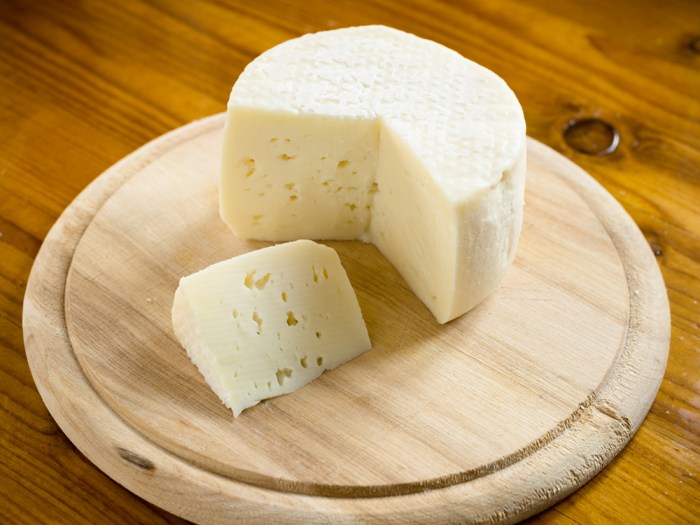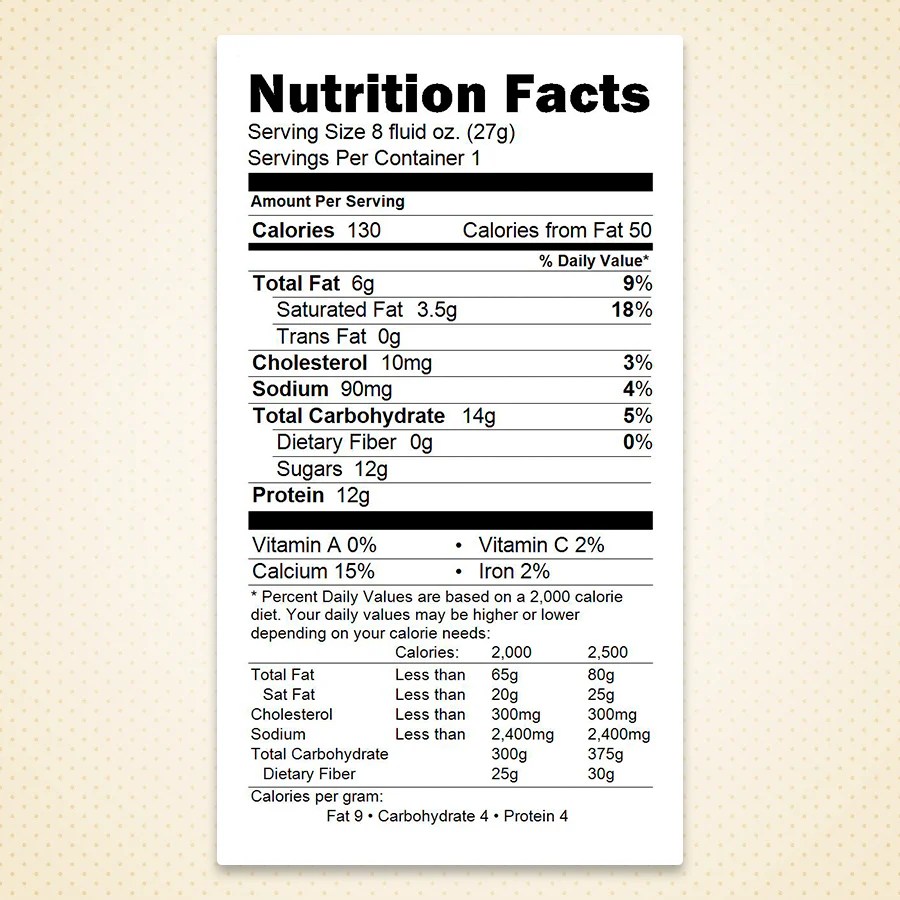Nutritional Composition of Goat Milk Cheese

Goat milk cheese nutrition – Goat milk cheese, a culinary delight across cultures, offers a unique nutritional profile distinct from its cow’s milk counterpart. Its subtly tangy flavor and varying textures, from creamy to firm, are complemented by a rich composition of macronutrients and micronutrients beneficial to health. This examination delves into the specifics of its nutritional makeup, comparing it to cow’s milk cheese to highlight its distinctive characteristics.
Macronutrient Composition of Goat Milk Cheese
The macronutrient content of goat milk cheese varies considerably depending on the type of cheese produced and its aging process. Generally, goat cheese is lower in fat than many cow’s milk cheeses, although this can fluctuate widely. Fresh, soft goat cheeses tend to be lower in fat, while aged, harder varieties can contain more. Protein content is usually comparable to cow’s milk cheese, providing a significant contribution to daily protein needs.
Okay, so we’re talking goat milk cheese nutrition, right? It’s packed with protein and certain vitamins. But if you’re watching your fat intake, a good comparison is to look at the nutritional profile of other cheeses, like the lower-fat options. For instance, checking out the details on low fat cottage cheese nutrition can give you a helpful benchmark.
Then you can compare that to your goat cheese choices to make informed decisions about your dietary needs.
Carbohydrate content is typically minimal, primarily consisting of lactose, the natural sugar in milk. For example, a fresh chèvre might have around 8 grams of fat, 7 grams of protein, and 1 gram of carbohydrates per ounce, while a hard, aged goat cheese could contain 12 grams of fat, 8 grams of protein, and less than 1 gram of carbohydrates per ounce.
These figures are approximate and will vary based on the specific cheese and its production method.
Micronutrient Content of Goat Milk Cheese, Goat milk cheese nutrition
Goat milk cheese is a good source of several essential micronutrients. Its nutritional profile makes it a valuable addition to a balanced diet. The following table provides a clearer picture of the vitamin and mineral content, although these values are estimates and may vary depending on the specific cheese:
| Nutrient | Amount per serving (1 ounce) | % Daily Value | Benefits |
|---|---|---|---|
| Calcium | ~200mg | ~20% | Essential for strong bones and teeth, muscle function, and nerve transmission. |
| Potassium | ~50mg | ~1% | Helps regulate blood pressure and fluid balance. |
| Phosphorus | ~100mg | ~10% | Crucial for bone health, energy production, and cell function. |
| Vitamin A | ~10% | ~10% | Supports vision, immune function, and cell growth. |
| Vitamin D | Variable, often added | Variable | Essential for calcium absorption, bone health, and immune function. |
| B Vitamins (B2, B12) | Small amounts | Variable | Contribute to energy metabolism and various bodily functions. |
Comparison with Cow’s Milk Cheese
While both goat and cow’s milk cheeses offer nutritional benefits, some key differences exist. Goat cheese generally contains less fat and more medium-chain triglycerides (MCTs), which are metabolized differently than long-chain triglycerides found in higher quantities in cow’s milk cheese. Some individuals find goat cheese easier to digest due to its smaller fat globules and different protein structure. The mineral content can also vary; goat cheese often has a higher concentration of certain minerals like potassium, while cow’s milk cheese may be richer in others.
Ultimately, the “better” choice depends on individual dietary needs and preferences. The specific nutritional profile of each cheese is heavily dependent on the type of milk used, the cheese-making process, and the aging period.
Health Benefits and Potential Risks of Goat Milk Cheese Consumption

Goat milk cheese, with its subtly tangy flavour and creamy texture, occupies a unique space in the culinary landscape. Beyond its gastronomic appeal, however, lies a complex interplay of potential health benefits and risks, a narrative woven from the very composition of the milk itself and its interaction with our individual bodies. Understanding this duality is key to incorporating goat cheese thoughtfully into a balanced diet.Goat milk cheese boasts a nutritional profile distinct from its cow’s milk counterpart.
Its higher concentration of short-chain fatty acids, for instance, can contribute to improved gut health and digestion, a boon for those with lactose intolerance or sensitivities. The calcium content, vital for bone health and density, is also significant, offering a natural and delicious way to bolster this crucial element in our diets. Furthermore, goat cheese often contains higher levels of certain vitamins and minerals compared to cow’s milk cheese, enriching its nutritional value.
Improved Digestion and Gut Health
The shorter and more easily digestible protein molecules in goat milk, coupled with its higher concentration of short-chain fatty acids, contribute to better gut health. These fatty acids, particularly butyrate, nourish the beneficial bacteria in our intestines, promoting a balanced gut microbiome and aiding in the digestion process. This makes goat cheese a potentially viable alternative for individuals who experience digestive discomfort with cow’s milk products.
For example, a study published in theJournal of Dairy Science* demonstrated improved lactose tolerance in participants consuming goat milk products compared to cow’s milk products. This improved digestion can translate to reduced bloating, gas, and other gastrointestinal distress.
Bone Health and Calcium Intake
Goat cheese is a rich source of calcium, a crucial mineral for maintaining strong bones and preventing osteoporosis. The bioavailability of calcium in goat milk is often cited as being higher than in cow’s milk, meaning the body absorbs it more efficiently. This is particularly beneficial for individuals at risk of bone loss, such as postmenopausal women or older adults.
Incorporating goat cheese into a diet rich in other bone-supporting nutrients, such as vitamin D and magnesium, can further enhance its positive effects on bone health. Consider a daily serving of goat cheese as part of a balanced breakfast or a healthy snack to maximize calcium intake.
Potential Allergic Reactions and Medication Interactions
While generally well-tolerated, goat milk cheese can trigger allergic reactions in some individuals. These reactions, although less common than cow’s milk allergies, can range from mild skin rashes to more severe symptoms such as anaphylaxis. Those with known milk allergies should exercise caution and consult with an allergist before consuming goat cheese. Furthermore, certain medications can interact with the components of goat cheese.
For instance, some medications that affect calcium metabolism may require careful consideration when incorporating goat cheese into the diet. Always consult with a healthcare professional regarding potential interactions between your medications and dietary choices.
Incorporating Goat Cheese into a Balanced Diet
Goat cheese’s versatility lends itself to diverse dietary approaches. For weight management, its relatively high protein content can contribute to satiety, helping to curb cravings and promote feelings of fullness. A small serving of goat cheese incorporated into a salad or paired with vegetables can provide a satisfying and nutritious meal option. For those aiming to increase calcium intake, goat cheese can be a valuable addition to breakfast, such as in scrambled eggs or alongside whole-grain toast.
Its creamy texture also makes it a delicious addition to smoothies or dips, enhancing both flavour and nutritional value.
Question Bank: Goat Milk Cheese Nutrition
Is goat cheese higher in fat than cow’s milk cheese?
Fat content varies greatly depending on the type of goat cheese and its aging process. Some goat cheeses are lower in fat than certain cow’s milk cheeses, while others are higher.
Can people with lactose intolerance eat goat cheese?
Goat cheese generally contains less lactose than cow’s milk cheese, but it’s not lactose-free. The amount of lactose varies by type and aging. Some individuals with lactose intolerance may tolerate small amounts, while others may not.
Is goat cheese a good source of protein?
Yes, goat cheese is a good source of protein, similar to cow’s milk cheese. The exact amount varies depending on the type and serving size.
How can I store goat cheese properly?
Store goat cheese in the refrigerator, ideally wrapped tightly in plastic wrap or stored in an airtight container. This helps to prevent it from drying out and maintain its freshness.
